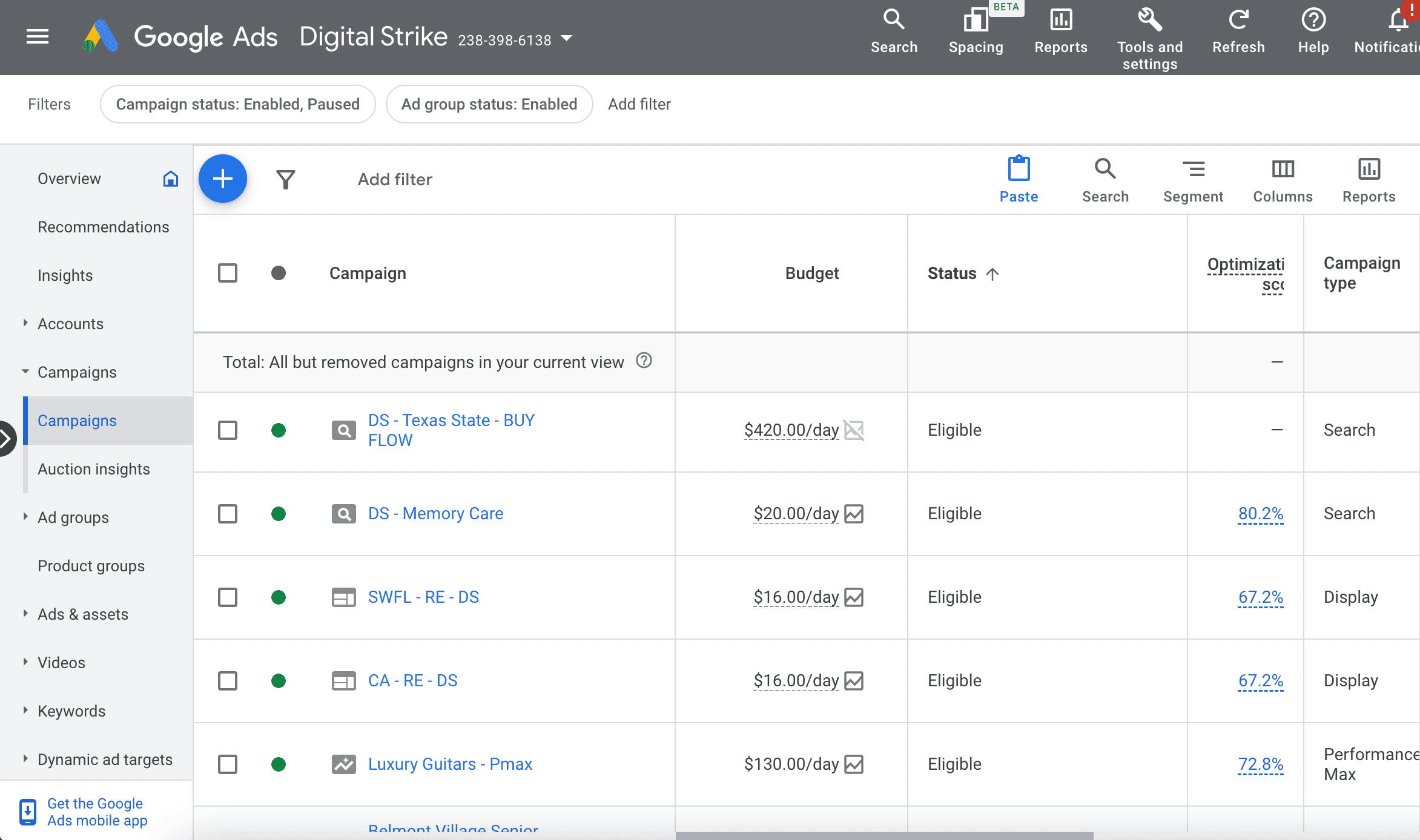Google Ads recommendations may seem like shortcuts to success, but blindly following these recommendations can sometimes lead to wasteful spending and little to no ROI.
At Digital Strike, we’ve helped hundreds of businesses of every size in almost every vertical with their paid search campaigns… So you can that say we’ve learned a thing or two about Google’s ad recommendations—including when NOT to use them.
Let’s explore five common types of recommendations from Google that demand careful scrutiny before implementation and the reasons why.

1. Adding Recommended Keywords
Google recommends keywords for two reasons: To enhance optimization scores and to increase ad spend.
Optimization score is somewhat of a fake metric that Google created to more or less suggest to inexperienced advertisers that they should use a variety of the ad variations Google offers. In doing this, you are expanding your reach across all channels like video, search, display, shopping, etc., while ultimately spending more money.
Why you should re-consider:
Rather than use these recommendations, it would be advised to dig deeper into what Google is suggesting. Google is a big proponent of running broad match keywords and—while the targeting for broad match has improved—it still isn’t always the best route. This is because broad match casts a wide net and, therefore, pulls in some terms that might not make sense for the business goals.
For example, let’s say you’re running ads for an assisted living community. Based on search history, Google is able to see that the large majority of searchers looking in the senior living realm are price shopping for affordable options. Therefore, some highly trafficked terms include “affordable apartments,” “cheap senior housing,” “government-assisted senior housing,” etc. Google then puts these terms into the recommended new keyword area for you to use in ads.
However, the problem with this is that the assisted living facility may not want to show up for these terms because it’s not what they offer at their business. This would result in wasted ad spend and poor Google ads account performance.
2. Increase Budget Based on Projections
If you do not have a high conversion rate, Google may suggest adding budget based on projections that forecast how many clicks you could receive if you increase spend by certain dollar amounts (this is not always the answer, though).
Why you should re-consider:
Yes, there are times when you truly aren’t showing because you aren’t spending enough to compete.
However, before you take Google’s suggestion to increase the budget, you need to first take a look at the impression share lost to budget—or Search Lost IS (Budget)—in order to determine if the actual spend really is the issue.
This metric gives a percentage of how many times your ads didn’t show because the campaign is limited by budget and is really the only time when you should consider increasing spend.
Google’s goal is to ramp up your spend to dominate search results, but that doesn’t mean you will get more conversions, especially if you are not losing budget to impressions.
If that is what is happening, then other factors need to be re-evaluated, such as keyword relevancy, ad quality, and landing page experience.
3. Switching Bidding Strategy
Google Adwords offers a number of bid strategies to use based on campaign goals. Here are a few examples:
- If you want to drive more traffic to your website, you should use the Maximize Clicks bid strategy.
- If you want to get the most conversions at the best price, Maximize Conversions or Target CPA bidding are the best options.
- Target Impression Share tells Google how often and where you want ads to show in search results, regardless of spend. This is usually best used for brand campaigns that want to ensure their name is front and center for all searches done using their name.
- If you have the opportunity to tie back revenue from the ad groups running, Target ROAS (return on ad spend) or Maximize Conversion Value are good strategies to utilize.
Why you should re-consider:
Google recommends changing bid strategies by calculating how much more you will spend to use those strategies. They aren’t taking into consideration the goal of the search campaign or budget limitations the advertiser might have.
When you do switch a bid strategy based on Google’s recommendation, you will often find less engagement and increased spending. That is the opposite of what most advertisers are looking to achieve and can damage the way campaigns are serving.
As a result, Google’s algorithm goes back into a learning phase, halting progress and usually missing opportunities that can increase sales or leads.
4. Turning on Google Search Partners Setting
Search Partners are a collection of websites that partner with Google to show ads and free product listings beyond regular search results. They extend ads to hundreds of non-Google websites, as well as on YouTube. These ads can show on site directory pages or other pages related to a person’s search.
Why you should re-consider:
The challenge with search partners is that the sites where ads appear are often not the type of sites you always want to have your ads on.
For example, they can show on parked domains or sites that are not related to the actual intent of the search. Most of the time, these sites eat up a lot of budget and have poor campaign performance with less qualified leads.
5. Applying Broad Match Types
Google has made a lot of changes to the way that broad match functions. As a result, they are trying to get more and more advertisers to use broad match because they feel the searches are more targeted based on user behavior and intent.
Why you should re-consider:
While it’s important to test the efficacy of using broad match, it often results in a lot of wasted traffic.
Broad match is good for campaigns that struggle to spend, are in niche markets, or are in heavily saturated markets; it really depends on the goal of the ads campaign.
However, if campaigns are not struggling and the lead volume is increasing at a healthy pace, it makes more sense to focus on more targeted match types like exact or phrase. These match types give you more control over what search terms you want to show up for and when.
Let Us Help With Your CPC Campaigns!
Smart pay-per-click (PPC) management is the key to success. We don’t throw darts and hope one sticks, and we certainly don’t just follow Google’s recommendations without careful scrutiny. We have proven strategies that we’ve developed over years of experience to drive conversion rates up and conversion costs down.
In addition to PPC, we also offer the following digital marketing services:
- On-site and off-site search engine optimization (SEO)
- Paid social
- Organic social
- Email marketing
- Local SEO
- Content marketing
- General digital marketing strategy
- Technical SEO
- Link building
- And much more!
Contact our experts today to see how we can empower your business with the right opportunities to grow.






